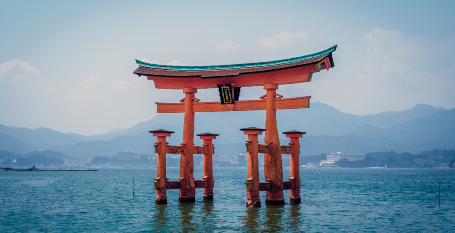Japan has announced it will end a two-year pandemic closure and reopen to tourists from June.
However, it's a gradual reopening - initially, travellers will only be allowed in as part of tour groups.
All arrivals have to test negative to Covid before travel to Japan and many must be tested again on arrival, though triple-vaccinated people coming from certain countries can skip the additional test as well as a three-day quarantine required for others.
Tour groups are expected to take responsibility for ensuring visitors respect Japan’s near-universal mask-wearing and other measures that have helped keep the toll from Covid comparatively low.
Inbound tourism numbers will be further restricted by a daily entry cap, which is currently at 20,000 per day.
There continues to be strong public support for tight restrictions and a cautious approach to managing Covid-19.
What's life like for LGBTQ people in Japan?
What’s life like for LGBTQ people in Japan? Let’s take a look at some of the key equality measures.
Is homosexuality legal in Japan?
Yes. Same-sex sexual activity has never really been addressed by Japan’s penal code.
Are there anti-discrimination protections in place for LGBTQ people in Japan?
Yes. Major cities have anti-discrimination provisions that protect against discrimination on the grounds of sexuality, but there’s not a comprehensive national framework.
Is there Marriage Equality in Japan?
No. Some city-level authorities have introduced partnership certificates which extend some legal recognition to same-sex relationships.
Japan’s constitution and civil code explicitly restrict marriage to opposite sex couples.
What’s life like for LGBTQ people in Japan?
While Japan can seem ultra-modern, underpinning Japan’s culture is a socially conservative and traditional view of the world.
Generally, Japan is fairly welcoming and accepting of LGBTQ people.
In larger cities, there is a visible LGBTQ community.
What’s the history of homosexuality in Japan?
Homosexuality and same-sex relations have been documented in Japan since ancient times.
In the pre-Meiji period, relationships inside Buddhist monasteries were typically pederastic. The older partner (the nenja) would be a monk, priest or abbot, while the younger partner (the chigo) would be an acolyte – an adolescent boy. The relationship would be dissolved once the boy reached adulthood or left the monastery. Both parties were encouraged to treat the relationship seriously and conduct the affair honourably, and the nenja might be required to write a formal vow of fidelity.
During the Tokugawa period, some of the Shinto gods – especially Hachiman, Myoshin, Shinmei, and Tenjin – came to be seen as guardian deities of nanshoku (male–male love).
Same-sex sexual activity was also common among the samurai – the warrior class. Among the samurai, it was customary for a boy in the wakashū age category to undergo training in the martial arts by apprenticing to a more experienced adult man. The relationship was based on the typical nenja, who loves, and the typically younger chigo, who is loved. The man was permitted, if the boy agreed, to take the boy as his lover until he came of age. These relationships were expected to be exclusive, with both partners swearing to take no other lovers.
Miyamoto Musashi – a legendary swordsman of the samurai era – is one of the most famous practitioners of the same-sex warrior lover tradition.
As Japan progressed into the Meiji era, same-sex practices continued. However, there was a growing animosity towards these practices. The practice of nanshoku began to die out after the Russo-Japanese War. Opposition to homosexuality did not become firmly established in Japan until the 19th and 20th centuries, through the Westernisation efforts of the Empire of Japan.












 列印版本
列印版本



















讀者回應
搶先發表第一個回應吧!
請先登入再使用此功能。